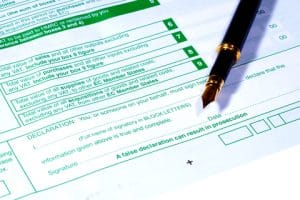In this article, we will look at Postponed VAT Accounting, how it works and how it could be of benefit to your business.
What is Postponed VAT Accounting?
So, what is postponed VAT accounting? Postponed VAT Accounting has been available in the UK since Brexit on 1 January 2021. The main purpose of Postponed VAT Accounting is to improve the cash flow of businesses that are importing goods into the UK.
Without Postponed VAT Accounting, the default mechanism is that a business will be billed for import VAT by their courier or freight forwarder at the point of import. This will need to be paid in order for the goods to clear customs. Then, when the business files its next VAT return, they are able to reclaim the import VAT they have paid. This therefore negatively impacts their cash flow as from the time they pay the import VAT to the courier up until the point when it is reclaimed on their VAT return, they are out of pocket for this import VAT.
Using Postponed VAT Accounting, instead of the business paying import VAT to the courier, they instead postpone the import VAT due. Then when the business comes to file its VAT return for that quarter, they will both pay and reclaim the VAT on the same return. Therefore there isn’t a time period when the business is out of pocket for the import VAT. It’s important to be mindful though when changing from paying at the point of import to postponing VAT, you should expect to see an increase in your quarterly VAT liability. This is because the business no longer has import VAT to reclaim on the return. Overall though, there is no cost or benefit in terms of profit and loss to using postponed VAT accounting, but there is a cash flow benefit to doing so.
Benefits of Postponed VAT Accounting to your Business
As outlined above, the key benefit to using Postponed VAT Accounting is the impact that using PVA has on your cash flow. This is because with PVA, the import VAT you would have paid at the time of import to subsequently reclaim on your VAT return, is instead postponed until the point of your VAT return and then reclaimed on the same return, so the import VAT never leaves your bank.
However, there are some other less significant benefits to be aware of. Firstly, PVA statements are available to easily download online. If you’re paying the import VAT at the point of import, the C79 certificates that you need for these imports are usually sent in the post by HMRC.
Secondly, there are some couriers that will prefer to use PVA by default, so if you are using multiple couriers, you may be better off using PVA so that all of your imports are treated consistently rather than worrying about keeping track of which couriers need the import VAT paid at the point of import and which are postponing the VAT.
Secondly, there are some couriers that will prefer to use PVA by default, so if you are using multiple couriers, you may be better off using PVA so that all of your imports are treated consistently rather than worrying about keeping track of which couriers need the import VAT paid at the point of import and which are postponing the VAT.
How Does It Work For Businesses Importing Goods Into The UK?
In order to postpone the VAT on an import, there are three important pieces of information that need to be included on your customs declaration. This is applicable to the small business as much as medium and large UK based organisations:
- UK VAT number
- UK EORI number
- Box 47e – this box on the customs declaration needs to be completed with the letter ‘G’ to indicate that the VAT return should be postponed.
If a 3rd party, such as a courier, is completing the declaration on your behalf, it is important to make them aware of the above information so that they can postpone the VAT on your behalf.
When is Postponed Import VAT Accounting Required?
In most instances PVA is optional for all businesses, however, there are certain circumstances when it may be required. It is important to confirm with your courier or freight forwarder if they are applying postponed VAT accounting to your shipments. It is possible for them to do so if they have your UK VAT and EORI number without actually making you aware that they are doing so. However, if they are not charging you for the import VAT, this should be a flag that they are applying postponed VAT accounting to your shipments.
Who is Eligible for PVA?
All businesses are eligible to use PVA to improve their cash flow. The exception to this is for any imports going to Northern Ireland rather than Great Britain. For these imports, postponed VAT is not necessary because the pre-Brexit reverse charge mechanism is applicable to these imports.
Is PVA Permanent?
Yes, postponed VAT accounting was introduced as a permanent measure on 1 January 2020 to mitigate the impact that leaving the EU had on businesses importing to the EU.
Do I Need To Use PVA?
No, PVA is optional for most businesses but it is likely to be beneficial for you to do so due to the cash flow benefits that it will bring.
How to Apply for Postponed VAT Accounting?
There is no formal application process to apply for Postponed VAT accounting, it is possible for any business with a UK VAT and UK EORI number to start using it straight away. If you don’t yet have a UK EORI number you can apply for one online here. In most cases, you will get an EORI number instantly. You will however need to have a government gateway account in order to access your PVA monthly statements. These cannot be downloaded by an agent (such as an accountant acting on your behalf). You must use the gateway account that is linked to your EORI number and the statements are only available for 6 months.
Final Thoughts
PVA accounting will give your business a cash flow benefit, which can be substantial when you have high-value imports. But is it important to remember that VAT bills will be higher as a consequence?



